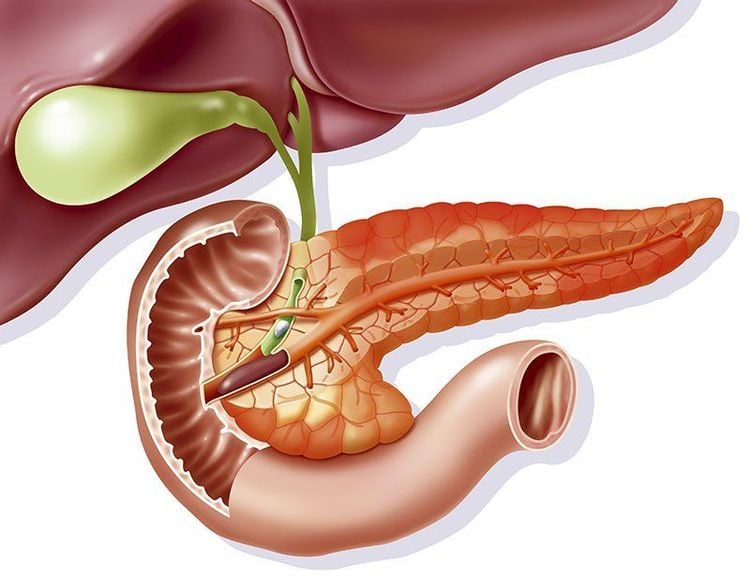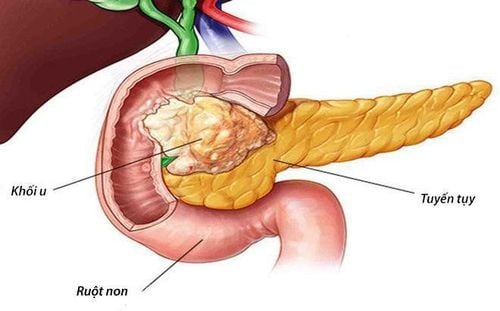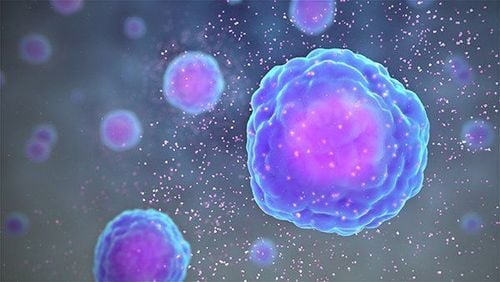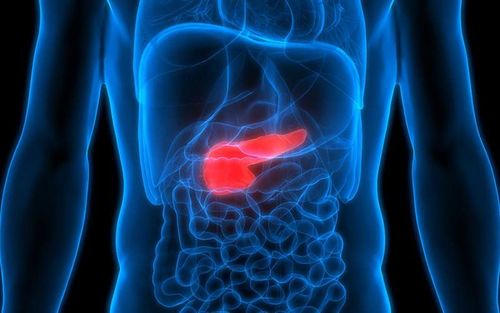This is an automatically translated article.
Post by Master, Doctor Mai Vien Phuong - Gastrointestinal Endoscopy - Department of Medical Examination & Internal Medicine - Vinmec Central Park International General Hospital.
The pancreas plays many roles, it makes the insulin needed to regulate glucose and enzymes to digest food and absorb nutrients. When you have a pancreatic disorder, you may experience symptoms such as pain and bloating, nausea or vomiting, diarrhea, weight loss, malnutrition...
1. What is the pancreas?
The pancreas makes digestive enzymes and hormones like insulin. This organ is located high in the abdomen, near the main arteries and veins.
The pancreas has three parts: the head, the tail, and the body of the pancreas. Digestive enzymes and hormones produced in the pancreas travel from the pancreas to the duodenum via the pancreatic duct. The part of the pancreas that produces hormones is called the endocrine pancreas, and the part that produces digestive enzymes is called the exocrine pancreas.
2. Common Pancreatic Disorders
The pancreas plays many roles. It produces the insulin needed to regulate glucose and the enzymes to digest food and absorb nutrients. When your pancreas is not working properly, you may have at least some of the following symptoms:
Pain and bloating Nausea or vomiting Diarrhea Pale colored stools Fever Weight loss Malnutrition These symptoms can be caused by exocrine pancreatic insufficiency, pancreatitis or some other disorder of the pancreas.
2.1. Pancreatitis is one of the pancreatic disorders Pancreatitis means that your pancreas is inflamed. There are several types of pancreatitis with different causes. The 3 main types are acute, chronic and hereditary.
Acute pancreatitis comes on suddenly, causing severe pain in the upper abdomen that can last several days. Causes of acute pancreatitis include: Gallstones; chronic alcohol use; injury; infection; certain drugs; abnormalities in electrolytes, lipids, or hormones; genetic. Treatment depends on the cause.
Chronic pancreatitis causes upper abdominal pain, diarrhea and weight loss. As the disease progresses, it causes irreversible damage to the pancreas. This can lead to diabetes and malnutrition due to chronic pancreatic failure. Causes include: Chronic alcohol use, cystic fibrosis, hereditary pancreatic disorders. Treatment depends on the cause and may include pancreatic enzyme replacement therapy (PERT), insulin, and pain control.
Pancreatitis can also be caused by hereditary pancreatitis or by abnormalities in the intestines. Hereditary pancreatitis is a progressive disease. Treatment may include pancreatic enzyme replacement therapy and pain control.

2.2. Exocrine pancreatic insufficiency Exocrine pancreatic insufficiency is a condition in which you are deficient in pancreatic enzymes to the point of malnutrition. One symptom of exocrine pancreatic insufficiency is increased fecal fat secretion.
You may also have an oily discharge from the anus. Other symptoms may include:
Bloating or cramping Diarrhea or bowel incontinence Weight loss Malnutrition Causes of chronic pancreatic failure include:
Pancreatitis Cysts or tumors Benign pancreas Obstruction or narrowing of the pancreatic duct or bile duct Pancreatic cancer Complications of pancreatic surgery Cystic fibrosis Diabetes The treatment for exocrine pancreatic insufficiency may be the use of pancreatic enzyme replacement therapy. Eat a low-fat diet (unless you have cystic fibrosis), take nutritional supplements (especially fat-soluble vitamins A, D, E, and K), and avoid alcohol and smoking.
2.3. Cystic Fibrosis Cystic fibrosis is an inherited pancreatic disorder that affects the lungs and gastrointestinal tract, including the pancreas. Symptoms of the disease include:
Frequent respiratory tract infections Coughing Stomach bloating Bad smelling stools Salty skin Unable to gain weight Growth retardation Malnutrition due to chronic pancreatic insufficiency Treatment for cystic fibrosis includes:
Pancreatic enzyme replacement therapy Medicines for breathing problems Breathing exercises and thoracic physiotherapy Appropriate diet and nutritional supplements Lung transplantation 2.4. Pancreatic cancer Advanced pancreatic cancer can cause yellowing of the skin and eyes as well as exocrine pancreatic insufficiency. Treatment for pancreatic cancer may include:
Surgery Chemotherapy Radiation Pain management Pancreatic enzyme replacement therapy 2.5. Diabetes Diabetes is a condition in which the pancreas does not produce enough insulin or the body cannot use it effectively. Insulin is needed to deliver glucose to cells throughout the body. Symptoms of uncontrolled diabetes include:
Excessive hunger and thirst Fatigue Frequent urination The link between diabetes and exocrine pancreatic insufficiency is not completely understood. But diabetes can lead to chronic pancreatic insufficiency, and long-term exocrine pancreatic insufficiency has been linked to diabetes.
Treatment of diabetes depends on the type, symptoms and complications. It may include diet management, insulin, and blood sugar monitoring. If you have diabetes and develop exocrine pancreatic insufficiency, your doctor may prescribe pancreatic enzyme replacement therapy.
2.6. Pancreatic surgery Sometimes, exocrine pancreatic insufficiency occurs after pancreatic surgery for pancreatic cancer, cysts, or benign tumors.

3. When to see the doctor? It is not necessary to see a doctor if you experience occasional gas and bloating. But if you regularly have trouble with digestion, there are some dangerous conditions that can cause these symptoms. It is important to find the cause so that appropriate therapy can be given.
If you have symptoms of exocrine pancreatic insufficiency, such as abdominal pain, foul-smelling stools and weight loss, see your doctor immediately. You may be malnourished and need treatment. Be especially aware of these symptoms if you are suffering from:
Acute or chronic pancreatitis Pancreatitis After pancreatic surgery Cystic fibrosis Diabetes You should also talk to your doctor or pharmacist before taking over-the-counter (OTC) digestive enzymes into the diet.
In summary, there are many different pancreatic disorders. Therefore, if you experience frequent or persistent digestive problems, you should seek medical attention for proper diagnosis and treatment.
Please dial HOTLINE for more information or register for an appointment HERE. Download MyVinmec app to make appointments faster and to manage your bookings easily.
References:Common disorders of the pancreas. (n.d.). pancreasfoundation.org/patient-information/about-the-pancreas/common-disorders-of-the-pancreas/ Jawaid S, et al. (2019). Exocrine pancreatic insufficiency following acute pancreatitis: True association or exocrine pancreatic insufficiency phenomenon? DOI: 10.1007/s10620-019-05653-z Struyvenberg MR, et al. (2017). Practical guide to exocrine pancreatic insufficiency – Breaking the myths. DOI: 10.1186/s12916-017-0783-y














